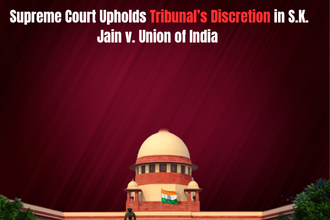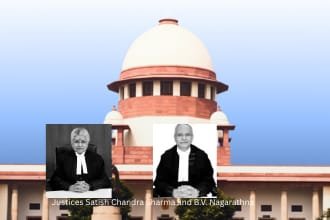The Supreme Court of India, in its recent decision in S.K. Jain v. Union of India & Anr., reported as 2025 LiveLaw (SC) 994, reiterated the well-established principle that appellate interference is unwarranted when a tribunal has exercised its discretion judiciously while rejecting a review petition. The Court held that the exercise of discretion by the Tribunal did not suffer from any legal infirmity or procedural irregularity. Consequently, the appeal was dismissed, reaffirming that review jurisdiction is to be exercised sparingly and only in cases of manifest error.
Background of the Case
The case originated from proceedings before a Tribunal where the appellant, S.K. Jain, had initially challenged certain service-related determinations made by the competent authorities. After the Tribunal rendered an adverse decision, the appellant sought a review of the order. In his review petition, he contended that the Tribunal had failed to consider certain material aspects and had committed apparent errors of law on the face of the record. However, upon detailed consideration, the Tribunal rejected the review petition, holding that none of the grounds raised by the appellant justified a reopening of the case.
Unhappy with the Tribunal’s refusal to entertain his review, S.K. Jain preferred an appeal before the Supreme Court. The central grievance was that the Tribunal had failed to exercise its review jurisdiction properly and had dismissed the petition without adequate reasoning. The appellant argued that his review application had raised substantial legal questions that warranted reconsideration. The Union of India, on the other hand, defended the Tribunal’s order, asserting that the review petition was merely an attempt to reargue the matter on merits, which is impermissible under law.
Observations of the Supreme Court
After hearing both parties and examining the record, the Supreme Court found no substance in the appellant’s contentions. The Court observed that the power of review is extremely limited and cannot be used as a tool for re-argument or for reappreciating evidence already considered. The Court reiterated that a review can only be entertained in cases where there is an error apparent on the face of the record, discovery of new evidence which could not have been produced earlier despite due diligence, or any other sufficient reason falling within the narrow scope defined by law.
The bench emphasized that discretionary powers exercised by a judicial or quasi-judicial authority should not be interfered with unless it is shown that such discretion was arbitrary, capricious, or based on irrelevant considerations. In the present case, the Tribunal had applied its mind to the contentions raised in the review petition and had assigned reasons for rejecting them. Therefore, there was no ground for the Supreme Court to substitute its own view for that of the Tribunal.
The Court noted in its order, “The aforesaid exercise of discretion, therefore, does not call for any interference in this appeal. The Tribunal did not commit any error in rejecting the petition for review filed by the appellant.” With these observations, the appeal was dismissed.
Legal Principles Reaffirmed
The ruling in S.K. Jain v. Union of India reinforces certain fundamental principles governing review and appellate jurisdiction in India. Firstly, it underscores that a review is not an appeal in disguise. A party cannot seek a review merely because they are dissatisfied with the outcome or believe that an alternative interpretation of facts or law is possible. Review is confined to correcting patent errors that strike at the root of the judgment.
Secondly, the judgment reiterates that the scope of appellate interference with discretionary orders is narrow. Unless the appellant can demonstrate that the discretion was exercised in a perverse or illegal manner, higher courts will not interfere merely because they might have arrived at a different conclusion. This judicial restraint preserves the integrity and finality of tribunal decisions, ensuring that litigation does not become endless.
Thirdly, the Court’s observations align with earlier precedents such as Lily Thomas v. Union of India and Northern India Caterers v. Lt. Governor of Delhi, where it was held that review jurisdiction is not meant for re-hearing a case but only for rectifying manifest errors or preventing miscarriage of justice.
Significance of the Judgment
The S.K. Jain decision is significant for both litigants and legal practitioners. It serves as a reminder that review petitions must be filed with utmost care and should not be used as a means to prolong litigation. The Court’s dismissal of the appeal also reflects its broader commitment to judicial efficiency and finality of decisions. In recent years, the Supreme Court has consistently discouraged frivolous review petitions that clog the judicial system and delay the conclusion of proceedings.
For administrative and service law matters, the judgment reiterates the autonomy of tribunals in exercising discretion. The Supreme Court’s refusal to interfere indicates a trend of deference towards specialized bodies, provided that their decisions reflect proper application of mind and adherence to principles of natural justice. This approach helps maintain a balance between judicial oversight and institutional independence.
Furthermore, the case highlights the importance of drafting review petitions with precision. Petitioners must demonstrate specific errors apparent on the face of the record, rather than making generalized assertions. Vague or repetitive arguments that were already addressed during the original proceedings are unlikely to meet the high threshold required for a review.
Implications for Future Cases
The judgment will likely be cited in future cases involving challenges to the dismissal of review petitions, especially before service tribunals and quasi-judicial bodies. It fortifies the position that appellate courts will not entertain appeals that merely question the manner in which discretion was exercised unless there is a clear miscarriage of justice.
By declining to interfere, the Supreme Court has reaffirmed that judicial discretion, when exercised judiciously and within the bounds of law, deserves respect. The decision also promotes judicial discipline by discouraging multiple rounds of litigation arising from the same cause of action.
From an academic perspective, the case contributes to the evolving jurisprudence on the scope of review and appellate restraint. It serves as a valuable precedent for students and researchers studying the contours of judicial review, discretion, and finality in administrative law.
Conclusion
In S.K. Jain v. Union of India & Anr. (2025 LiveLaw (SC) 994), the Supreme Court has once again clarified that the discretionary rejection of a review petition does not automatically warrant appellate interference. The Court’s decision reinforces the limited nature of review jurisdiction and underscores the importance of judicial restraint. The Tribunal’s order was found to be well-reasoned and within the bounds of law, leaving no room for the apex court to intervene.
The ruling serves as a clear message to litigants that reviews are not meant to offer a second round of arguments but to correct evident mistakes. It strengthens the principle of finality in judicial proceedings while ensuring that discretion, when exercised reasonably and in good faith, remains beyond the scope of unnecessary interference. The judgment thus upholds the balance between fairness, efficiency, and judicial discipline — cornerstones of India’s legal system.
Also Read
Delhi High Court: Reckless Allegation of Infidelity Constitutes Cruelty Against Spouse
Consumer Court Pulls Up Amazon for Delivering Wrong Product and Refusing Refund



